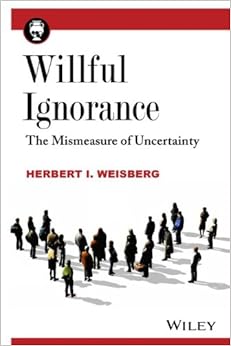I just finished reading Willful Ignorance: The Mismeasure of Uncertainty by Herbert Weisberg. I gave this book five stars (out of five) on Goodreads.

According to Weisberg, the text can be
"regarded as two books in one. On one hand it is a history of a big idea: how we have come to _think_ about uncertainty. On the other, it is a prescription for change, especially with regard to how we perform research in the biomedical and social sciences" (p. xi).
Willful ignorance is the idea that to deal with uncertainty, statisticians simplify the situation by filtering out or ignoring much of what we know…we willfully ignore some information in order to quantify the amount of uncertainty.
The book gives a cogent history and evolution of the ideas and history of probability, tackling head-on the questions: what is probability, how did we come to our current understanding of probability, and how did mathematical probability come to represent uncertainty and ambiguity.
Although Weisberg presents a nice historical perspective, the book is equally philosophical. In some ways it is a more leisurely read of the material found in Hacking, and in many ways more compelling.
I learned a great deal from this book. In many places I found myself re-reading sections and spiraling back to previously read sections to read them with some new understanding. I may even try to assign parts of it to the undergraduates I am teaching this summer.
This book would make a wonderful beach read for anyone interested in randomness, or uncertainty, or any academic hipster.

